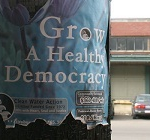Political parties seem to be in trouble in almost all countries that are recognised as broadly democratic. This is apparent in the manner in which conventional ways of conducting democratic politics are being challenged in various countries.
Italy is a recent and dramatic example. The inability to form a government, more than a month after national elections were held on February 24, prompted centre-left leader Pier Luigi Bersani to say that “…Only a mentally ill person could have an itching desire to govern right now.”
Across Europe, where the system of political parties originated, parties are rapidly losing functionality, respect and membership – and this is reflected in mixed, low or indifferent voter turnouts during various elections.
In Italy, a disenchanted public spread its vote: approximately 32% to the centre-left coalition led by Bersani, 31% to the centre-right led by former Prime Minister Berlusconi and 24% to the anti-party Five Star movement led by former comedian, Guiseppe Piero (Beppe) Grillo. The incumbent prime minister, Mario Monti, got only 9% of the votes.
Italy’s voter turnout of 75% should have been a cause for celebration, as should have been the following facts: that this election brought in the highest-ever number of women (32%) to have been elected in Italy, the lowest average age of the members of Parliament is 45 years, and 60% of the candidates who got elected are first-time MPs. Instead, the complexities of the system of majorities in the House and Senate, the refusal of Grillo’s group to join any coalition, and the reluctance of any party to work with Berlusconi, have all led to a prolonged stalemate. A re-election may be necessary, even as the economy unravels.
The exact sequence and causes of the change in people’s attitude towards political parties vary across countries. But there are common factors too – precarious economies, a leaching of ideology, a weakening of the mainstream news media and a decline of trade unions, which in the past contributed to a dynamic political discourse.
While conventional political parties seem to be on the decline, the simultaneous emergence of a whole new set of communication tools is enabling different ways of political expression and mobilisation. That, in turn, is further contributing to the disarray of parties, whose structure and organisation remain largely unchanged since they emerged in the UK in the mid-19th century. With technology and social media empowering individuals, it is even more difficult now for old-style parties to hold on to fixed ideologies and policies.
The Italian imbroglio has been the subject of mildly contemptuous humour -especially in the Anglo-Saxon press – but a similar pathology afflicts the entire democratic world. Greece had such a difficult time forming a government that a second election had to be called in June 2012 on the single question of the EU-required austerity package in exchange for a bailout.
In the UK, two parties constitute the present government. In a country with a population of approximately 67 million, the membership of each party has fallen to below 2,00,000. The annual party conferences are hollowed-out rituals. Britain now has a more pluralistic population, which can see the narrowing of ideological differences between the parties. Although the campaign platforms of the two parties were completely opposed on all issues, starting with membership of the EU, people know that ideological stands on important issues are now easily set aside when forging opportunistic governing coalitions, as the present government in the UK has done.
In the U.S., the electorate is frustrated by “the choice without a difference” that a two-party polity offers. No U.S. president has ever won the support of 50% of the electorate, and all attempts to create a third party have failed, as have efforts by independent candidates to challenge the two-party system, which peaked at less than 20% of votes for Ross Perot in 1992. Extreme political polarisation results in ambiguous outcomes in the U.S. Although it has a winner-takes-all system, and President Barack Obama recaptured the presidency by approximately 4% more of the popular vote, he has been unable to use the increased heft to enact even a budget.
In India, an equally disturbing variant is the consolidation of dynastic parties, run by families that alternate at both the centre and in the states. In the 2009 national election, the Congress was ahead of the Bharatiya Janata Party, its principal challenger, by less than 2% of the popular vote. An unwieldy coalition of numerous big and small regional parties has sapped governance of all coherence. The Congress functions without any ideology and ends up sacrificing national objectives to cater to regional pressures, or flits between the personal inclinations of powerful leaders and its own internal factions.
Mahatma Gandhi did not have much faith in political parties. He believed a village republic was more genuinely democratic, environmentally sustainable, and upheld the dignity of the people as decision-makers. Although he led the nation to independence using the Congress party as the instrument, his relationship with it was always ambiguous. At the All-India Congress Committee meeting in November 1947, he said, “I am convinced that no patchwork treatment can save the Congress. It will only prolong the agony. The best thing for the Congress would be to dissolve itself before the rot sets in further.”
Are we now in an era in which only the tools of social media can help realise grassroots empowerment in our village republics, and those of ordinary citizens the world over?
Ambassador Neelam Deo is Director of Gateway House: Indian Council on Global Relations and former Ambassador to Denmark and former Joint Secretary for Myanmar, Sri Lanka, Nepal and Bangladesh.
This article was exclusively written for Gateway House: Indian Council on Global Relations. You can read more exclusive content here.
For interview requests with the author, or for permission to republish, please contact outreach@gatewayhouse.in.
© Copyright 2013 Gateway House: Indian Council on Global Relations. All rights reserved. Any unauthorized copying or reproduction is strictly prohibited.


